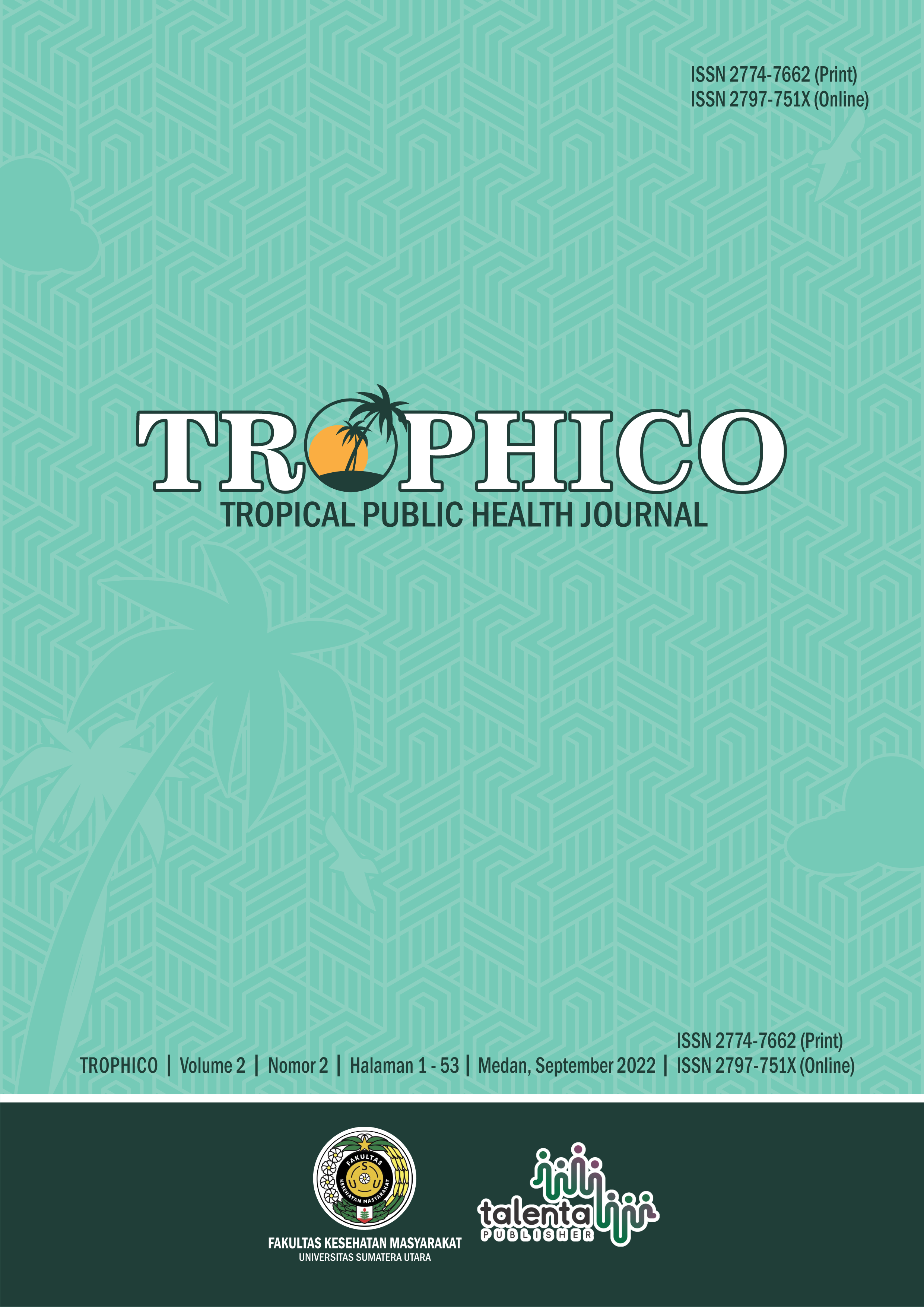Perawatan Postpartum Suku Simalungun: Studi Fenomenologi
DOI:
https://doi.org/10.32734/trophico.v2i2.8793Keywords:
Postpartum, Simalungun, fenomenologi, interview, budayaAbstract
Masa nifas atau masa postpartum adalah masa sejak bayi dilahirkan hingga plasenta lepas dari rahim, dan ini berlanjut sampai enam minggu berikutnya. Beberapa budaya dan suku di Indonesia menunjukkan bahwa terdapat beberapa tradisi yang sudah dilakukan secara turun temurun dalam penanganan ibu sebelum dan setelah melahirkan. Namun, masih belum banyak penelitian yang dilakukan terkait persepsi budaya perawatan ibu nifas pada suku suku di Indonesia termasuk suku Simalungun. Penelitian ini bertujuan untuk mengeksplorasi perawatan ibu nifas menurut suku Simalungun di Indonesia. Desain penelitian yang digunakan adalah studi fenomenologi dengan teknik in-depth interview. Teknik pengambilan sampel yang digunakan adalah purposive sampling terhadap sepuluh partisipan yang dilaksanakan pada bulan April – Juni 2018. Setiap partisipan diwawancarai dengan pertanyaan terstruktur sekitar 45-60 menit. Transkrip hasil wawancara dibaca berulang ulang untuk menganalisis tema dan sub tema. Analisa data dilakukan dengan thematic analysis. Hasil penelitian menunjukkan enam tema perawatan ibu nifas menurut suku Simalungun, yaitu (1) Pengaturan Fisik Ibu Post Partum, (2) Pantangan Makanan Tertentu (3) Pembatasan Aktivitas (4) Dukungan Keluarga (5) Tradisi Sebelum Kelahiran Bayi (6) Perawatan Setelah Kelahiran Bayi. Hasil penelitian ini diharapkan dapat dijadikan sebagai sumber pengetahuan dan strategi dalam melakukan pelayanan kesehatan terhadap ibu nifas berbasis budaya. Sehingga kearifan lokal budaya tertentu bisa menjadi salah satu pendekatan kesehatan berbasis komunitas. Hasil penelitian ini dapat digunakan sebagai informasi awal dan dapat menjadi sumber pengetahuan pada penelitian berikutnya tentang perawatan ibu nifas dengan berbagai suku di Indonesia.
Downloads
References
Abdollahpour, S., Ramezani, S., & Khosravi, A. (2015). Perceived Social Support among Family in Pregrant Women. International Journal of Pediatry, 3(21), 879–888. https://ijp.mums.ac.ir/article_4703_9fc40d3fb14a35c0ab5d7da79671c613.pdf
Ade, L., Wiradnyani, A., Khusun, H., Achadi, E. L., Ocviyanti, D., & Shankar, A. H. (2016). Role of family support and women ’ s knowledge on pregnancy-related risks in adherence to maternal iron – folic acid supplementation in Indonesia. 19(15), 2818–2828. https://doi.org/10.1017/S1368980016001002
Altuntuğ, K., Anık, Y., & Ege, E. (2018). Traditional practices of mothers in the postpartum period: Evidence from Turkey. African Journal of Reproductive Health, 22(1), 94–102. https://doi.org/10.29063/ajrh2018/v22i1.9
Chen, C., & Chen, H. (2007). Postpartum Taiwanese women : their postpartum depression , social support and health-promoting lifestyle profiles. https://doi.org/10.1111/j.1365-2702.2006.01837.x
Fadzil, F., Shamsuddin, K., & Wan Puteh, S. E. (2016). Traditional postpartum practices among Malaysian mothers: A review. Journal of Alternative and Complementary Medicine, 22(7), 503–508. https://doi.org/10.1089/acm.2013.0469
Fogel, N. (2017). The inadequacies in postnatal health care. Current Medicine Research and Practice, 7(1), 16–17. https://doi.org/10.1016/j.cmrp.2016.12.006
Garneau, A. B., & Pepin, J. (2015). Cultural Competence: A Constructivist Definition. Journal of Transcultural Nursing, 26(1), 9–15. https://doi.org/10.1177/1043659614541294
Jahdi, F., Mehrabadi, M., Mortazavi, F., & Haghani, H. (2016). The effect of slow-stroke back message on the anxiety levels of Iranian women on the first postpartum day. Iranian Red Crescent Medical Journal, 18(8). https://doi.org/10.5812/ircmj.34270
Jameela. (2018). Effectiveness of sodium chloride application on episiotomy wound healing among postnatal mothers at Government Rajaji Hospital, Madurai. October. http://repository-tnmgrmu.ac.in/11648/1/300327518jameela.pdf
Jeenwal, A., Jharbade, H., & Singh, N. (2019). An evaluation of abnormal puerperium. International Journal of Reproduction, Contraception, Obstetrics and Gynecology, 8(4), 1491. https://doi.org/10.18203/2320-1770.ijrcog20191205
Karahan, N. (2017). Traditional Practices of Pregnancy, Birth and Postnatal Turnover in Women at Birth. Southern Clinics of Istanbul Eurasia, 28(3), 190–198. https://doi.org/10.14744/scie.2017.33042
Köhler, R., Lambert, C., & Biesalski, H. K. (2019). Animal-based food taboos during pregnancy and the postpartum period of Southeast Asian women – A review of literature. Food Research International, 115, 480–486. https://doi.org/10.1016/j.foodres.2018.10.026
Kołomańska-Bogucka, D., & Mazur-Bialy, A. I. (2019). Physical activity and the occurrence of postnatal depression—a systematic review. Medicina (Lithuania), 55(9). https://doi.org/10.3390/medicina55090560
Lee, A., & Brann, L. (2015). Influence of Cultural Beliefs on Infant Feeding, Postpartum and Childcare Practices among Chinese-American Mothers in New York City. Journal of Community Health, 40(3), 476–483. https://doi.org/10.1007/s10900-014-9959-y
Mahiti, G. R., Mbekenga, C. K., Kiwara, A. D., Hurtig, A. K., & Goicolea, I. (2017). Perceptions about the cultural practices of male partners during postpartum care in rural Tanzania: A qualitative study. Global Health Action, 10(1). https://doi.org/10.1080/16549716.2017.1361184
Mahiti, G. R., Mkoka, D. A., Kiwara, A. D., Mbekenga, C. K., Hurtig, A. K., & Goicolea, I. (2015). Women’s perceptions of antenatal, delivery, and postpartum services in rural Tanzania. Global Health Action, 8(1). https://doi.org/10.3402/gha.v8.28567
Müller-Staub, M., Lavin, M. A., Needham, I., & Van Achterberg, T. (2006). Nursing diagnoses, interventions and outcomes - Application and impact on nursing practice: Systematic review. Journal of Advanced Nursing, 56(5), 514–531. https://doi.org/10.1111/j.1365-2648.2006.04012.x
Nuraini, T., Tumanggor, R. D., Hungerford, C., Lees, D., & Cleary, M. (2020). Caregiver Burden for People with Schizophrenia in Medan, Indonesia. Issues in Mental Health Nursing, 0(0), 1–4. https://doi.org/10.1080/01612840.2020.1847223
Oatsawaphonthanaphat, S., Srikam, W., & Chokevivat, V. (2015). Rehabilitation of postpartum mothers based on Thai traditional medicine in Nakhon Pathom Province, Thailand. http://personnel.ssru.ac.th/useruploads/files/20180328/9955c1e7fc98bf68742d5d7e782bc46ce222864d.pdf
Polat, S., Özyazicioğlu, N., & Bıçakci, H. (2015). Traditional practices used in infant care. Indian Journal of Traditional Knowledge, 14(1), 47–51. http://nopr.niscair.res.in/bitstream/123456789/32025/1/IJTK 1%281%29 47-51.pdf
Probandari, A., Arcita, A., Kothijah, K., & Pamungkasari, E. P. (2017). Barriers to utilization of postnatal care at village level in Klaten district, central Java Province, Indonesia. BMC Health Services Research, 17(1), 1–9. https://doi.org/10.1186/s12913-017-2490-y
Ranabhat, C., Kim, C. B., Choi, E. H., Aryal, A., Park, M. B., & Doh, Y. A. (2015). Chhaupadi Culture and Reproductive Health of Women in Nepal. Asia-Pacific Journal of Public Health, 27(7), 785–795. https://doi.org/10.1177/1010539515602743
Reid, K. M., & Taylor, M. G. (2015). Social support , stress , and maternal postpartum depression : A comparison of supportive relationships. SOCIAL SCIENCE RESEARCH, 54, 246–262. https://doi.org/10.1016/j.ssresearch.2015.08.009
Rodgers, R. F., Flynn, J. L. O., Bourdeau, A., & Zimmerman, E. (2018). A biopsychosocial model of body image , disordered eating , and breastfeeding among postpartum women. Appetite, 126(January), 163–168. https://doi.org/10.1016/j.appet.2018.04.007
Rosnani, ., Jawiyah, ., & Mediarti, D. (2019). Warm Steam Therapy to Increase Breast Milk Production of Post-Partum Mothers. Inc 2018, 373–378. https://doi.org/10.5220/0008325503730378
Sari, N., Soejoenoes, A., Wahyuni, S., Setiani, O., & Anwar, C. (2017). the Effectiveness of Combination of Oxytocin and Endorphin Massage on Uterine Involution in Primiparous Mothers. Belitung Nursing Journal, 3(5), 569–576. https://doi.org/10.33546/bnj.193
Son, J. (2016). Perceptions and Challenges: Postpartum Care Among Korean Americans Through an Online Community. Journal of Transcultural Nursing, 27(3), 241–248. https://doi.org/10.1177/1043659614556353
Tani, F., & Castagna, V. (2017). Maternal social support, quality of birth experience, and post-partum depression in primiparous women. Journal of Maternal-Fetal and Neonatal Medicine, 30(6), 689–692. https://doi.org/10.1080/14767058.2016.1182980
Tumanggor, Roxsana Devi, Elfira, Eqlima., Aizar, E. (2020). Female Caregiver Stress in Caring for Hospitalizzed Elderly with Chronic Disease at Universitas Sumatera Utara Hospital: A Phenomenology Study. Technium Social Sciences Journal, 20(0), 643–651.
Tumanggor, R., Elfira, E., & Aizar, E. (2020). Female Caregiver Devotion as a Stress Factor in Caring for Hospitalized Elderly in Indonesia. International Journal of Nursing Education, 12(2), 106–111. https://doi.org/https://doi.org/10.37506/ijone.v12i2.4273
Withers, M., Kharazmi, N., & Lim, E. (2018). Traditional beliefs and practices in pregnancy, childbirth and postpartum: A review of the evidence from Asian countries. Midwifery, 56(March 2017), 158–170. https://doi.org/10.1016/j.midw.2017.10.019
Zeyneloğlu, S., & Kısa. (2018). Traditional practices for maternal and newborn care among Turkish postpartum women. Applied Nursing Research, 39, 148–153. https://doi.org/10.1016/j.apnr.2017.11.018
Downloads
Published
How to Cite
Issue
Section
License
Copyright (c) 2022 Tropical Public Health Journal

This work is licensed under a Creative Commons Attribution-ShareAlike 4.0 International License.



















